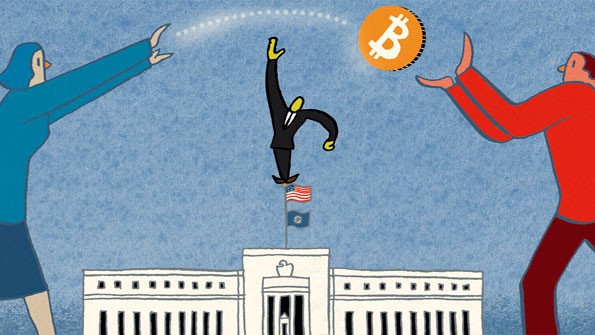Why Are Governments Wary Of Bitcoin

Why Are Governments Wary Of Bitcoin?
Since its debut in a 2008 document, Bitcoin (BTCUSD) has sparked debate and made headlines worldwide. The cryptocurrency’s debut heralds as the beginning of its supporters’ new and fair monetary system. Critics refer to the cryptocurrency’s involvement in illegal activities, as well as its lack of legal recognition, as evidence that it is “rat poison squared.” The truth, though, is most likely somewhere in the middle. Meanwhile, governments all around the globe are keeping a close watch on Bitcoin’s progress. Some countries, such as El Salvador, have accepted it as a kind of money. However, major economies, like the United States, have refused to accept it as legal currency in any form. The motives for their actions are valid ones.
Bitcoin, along with other things, provides the people of a nation with the ability to undermine government power by bypassing capital restrictions established by the government. It also makes nefarious actions easier to carry out by making it easier for crooks to avoid discovery. As a final point, by eliminating all middlemen, Bitcoin can throw a wrench into the current financial infrastructure system, making it more unstable.
In Whom Can We Put Our Faith?
To better understand why governments are cautious about Bitcoin, it is necessary first to understand the function that fiat currencies play in a country’s overall economy. Traditional currencies, such as those issued by governments, are referred to as fiat. Fiat money is money created by a government and backed by that government’s full faith and credit. It implies that governments pledge to reimburse the borrower of a currency’s principal and interest in the event of a default. The Federal Reserve, a central bank over which Congress has minimal power, is tasked by the United States government with printing or creating money for the country’s economy.
The cycle of transactions in the United States economy, which includes borrowers, lenders, and consumers, is dependent on a chain of trust between the parties involved in the transaction. The Federal Reserve, often known as a lender of last resort, is the last link in this network of institutions. Bitcoin proponents accuse the Federal Reserve of producing money out of thin air, implying that tangible assets do not back the currency. They claim that the central bank is also responsible for creating asset bubbles and financial crises by influencing the quantity of money in the US economy.
Governments make it easier for central banks to play a role in an economy. While central banks are engaged in formulating monetary policy, they do not have the power to control money circulation. The government must take care of this. Governments distribute and control the movement and usage of money in an economy via several intermediaries, such as banks and financial organizations, to keep the economy running smoothly. Taxing the profits of people and businesses is another way in which they get money from it. Also, start trading with bitcoin wallets
Bitcoin Threatens The Integrity Of The Trust Cycle
The decentralized nature of Bitcoin’s structure can demolish the system outlined before. Its network eliminates the need for intermediaries and, as a result, eliminates the need for the components of a government’s approach. It is no longer necessary to have a central bank since Bitcoin, the money, can be created by anybody who has access to a complete node. The ability to make peer-to-peer transactions between two parties on the Bitcoin network implies that intermediaries are no longer needed to manage and distribute money. Bitcoin’s network replaces the trust chain that underpins the existing financial infrastructure with a mathematical construct called a hash.
It is impossible to include a transaction in the central ledger until all complete nodes have authorized it. Even a single discrepancy or mistake in a transaction entry may result in the transaction rejects outright. At the very least, theoretically, the streamlining of activities between people and between different players on Bitcoin’s blockchain has the potential to reorganize the existing system. It is not a single or set of authorities who have the power to raise or reduce the supply of money, as is the case with the majority of the world’s financial infrastructure.
What Is It About Bitcoin That Makes Governments So Wary?
Is it possible for Bitcoin enthusiasts to envision a world free of governments and regulations? That is still an unanswered issue at this point. Meanwhile, governments across the globe are attempting to determine what impact cryptocurrencies may have on their economies shortly. They are mainly concerned with the following three issues that Bitcoin raises in its current form:
Bitcoin Has The Potential To Bypass Capital Restrictions Imposed By Governments
Governments often use capital restrictions to limit the outflow of a currency’s value since exports have the potential to debase the currency’s value. The fact that bitcoin is a stateless currency makes it an excellent tool for evading capital restrictions and exporting wealth in such situations. One of the most well-known examples of wealth flight via Bitcoin happened in China, worth mentioning here. The acquisition of foreign currency by nationals of the country restricts to $50,000 per year. More than $50 billion in bitcoin was transferred from China-based bitcoin wallets to wallets in other countries in 2020, according to a report by Chainalysis, a crypto forensics firm. It suggests that Chinese citizens may have converted their local currency to Bitcoin and transferred it across borders to avoid government regulation.
Bitcoin Has A History Of Being Associated With Criminal Activities
The capacity to circumvent a country’s existing financial infrastructure is a blessing in disguise for criminals, as it allows them to conceal their participation in illegal operations while maintaining their anonymity. Bitcoin’s network is pseudonymous, meaning that their addresses can only recognize individuals on the web rather than their names. It is impossible to trace the origins of a transaction or determine the identity of the person or organization responsible for an address.


